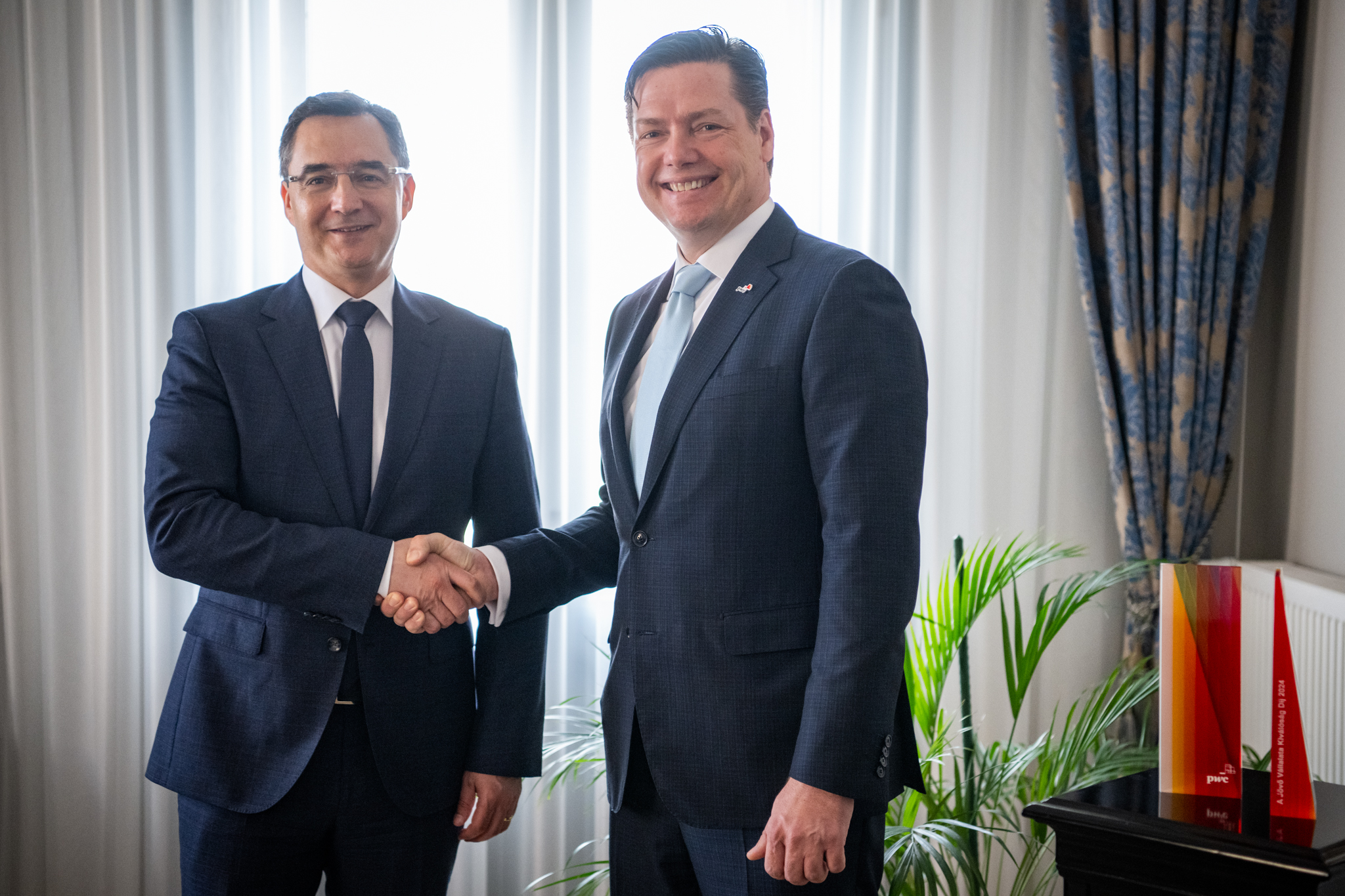PwC CEO Survey: As Pessimism Grows, so do Opportunities

The ninth PwC Hungarian CEO survey, the results of which were presented to an invited audience at the National Gallery on March 5, proved something of a contradictory beast, though local company heads are not so very different from their global counterparts in most cases.
Tamás Lőcsei, PwC Hungary, CEO
Two-thirds (66%) of the 223 Hungarian CEOs personally interviewed between October and December 2019 for the survey predicted a slowdown in global economic growth in 2020 (and 60% predicted the same for the Hungarian economy), a record level of pessimism by some way. Global peers are not so very far behind, with 53% expecting a decline. (See Do You Believe Global Economic Growth Will Improve, Stay the Same, or Decline Over the Next 12 Months? chart)

Here, immediately, was the first contradiction. As Barbara Koncz, Director at PwC Hungary’s Tax and Legal Services and one of the presenters on the night, put it, CEOs are negative about “the growth of the economy, not in the economy itself.”
Indeed, asked about their own company’s prospects for revenue growth, 81% of CEOs remain confident. As has been the trend for five years now, that put Hungarian CEOs’ slightly ahead of their global peers (73%). (See How Confident are you About Your Organization’s Prospects for Revenue Growth Over the Next 12 Months? chart)

One area where there was clear water between Hungarian and global CEOs was in the threat posed to organizational growth prospects by climate change. Where 64% of global CEOs saw a worry here, only 38% did so in Hungary.
“We have had no snow this year (we had some in December, but none this year), spring arrived in February and we have had record temperatures,” PwC Hungary CEO Tamás Lőcsei said in his summary.
Koncz offered one possible explanation: “We think CEOs see climate change as an opportunity more than a threat,” she had said earlier. Two-thirds of Hungarian CEOs have recognized that investing in “green” initiatives provides a reputational advantage. Nearly half of the respondents realize that going green will afford significant new product and service opportunities.
Lőcsei pointed out another contradiction over training and upskilling; while Hungarian CEOs worry that competitors will poach their trained staff, those CEOs who have embraced upskilling are realizing the rewards, such as higher workforce productivity, a stronger corporate culture, and improved talent retention.

Barbara Koncz, Director at PwC Hungary’s Tax and Legal Services
Biggest Threats
What was seen as the biggest threat will come as no surprise to those in business in Hungary: skills shortages and changing workforce demographics continue to be the main barriers to growth, at 88% and 70% respectively (the former scored 74% globally; the latter was not surveyed this year globally).
For the first time this year, exchange rate volatility (66% locally, 59% globally) has overtaken overregulation and an increasing tax burden in the list of top threats for Hungarian CEOs. A new item among these threats is uncertain economic growth, which has risen to first place this year at the global level at 81%, and sixth in Hungary (58%).
Global CEOs are increasingly concerned about cyber threats (73%), climate change and environmental damage, while Hungarian CEOs’ concerns in that respect have remained largely unchanged from last year. (See List of Top Potential Economic, Policy, Social and Environmental Threats to Organization’s Growth Prospects chart.)

Two-thirds of CEOs consider over-regulation to be one of the key barriers to growth. Those who consider this a threat are essentially concerned about data and cyber security, and compliance with industry regulations.
Future Predictions
Lőcsei also revealed some future predictions by Hungarian CEOs. A majority, for example, believe within 10 years the retirement age will have been raised from 65 to 70.
“This will not solve the problems of the pay as you go pension system, but at least we will have five more years together,” he joked. Also by 2030, 60% of CEOs believe Hungary will have joined the euro.
By 2035, most believe the average life expectancy at birth will be 80 years. Two years after that, in 2037, the CEOs predict autonomous cars will be wide spread in Hungary. Finally, “Close to one-third of business leaders said that by 2042 Hungary would have managed to halt the decline in population.”
He concluded by reminding his audience that difficult times also present opportunities; while optimism over economic growth may never have been so low since PwC took its first survey in Hungary in 2012, “This is something we can build up from.”

Other Highlights
CEOs are also confident about their company’s financial performance compared to competitors: more than half of them said they achieved better business outcomes than their competitors.
Compared to the 2019 survey, the percentage planning to restructure their organization has not increased. In contrast with global results, a much smaller percentage of Hungarian CEOs will rely on organic growth, and they are less likely to carry out acquisitions or form a strategic alliance. A breakout opportunity for organizations could be the launch of new products or services, which 60% of CEOs say they are planning to do over the next 12 months.
More than half the Hungarian CEOs asked said they are not planning to take on new staff over the next 12 months. Compared to 2019, the percentage of respondents planning to increase headcount dropped by 15 percentage points.
A third of CEOs feel that the key to their success is that they see clearly how they can create value for their clients. Another key factor is the ability to attract and retain talent, and to differentiate their products and services from the competition. It is increasingly important for CEOs to make it a strategic priority to come up with goals that provide a competitive edge.
Those CEOs of companies at the forefront of upskilling are more confident about both Hungarian and global economic growth, if not over the next 12 months, certainly over a three-year period.
When asked about which emerging technology areas are most important for business and government to collaborate on, CEOs ranked digital privacy and cybersecurity, in roughly equal measure, as the two most important areas, followed in third place by artificial intelligence. (See What key Factors are Having the Greatest Impact in Shaping your Cybersecurity Strategy? chart)

SUPPORT THE BUDAPEST BUSINESS JOURNAL
Producing journalism that is worthy of the name is a costly business. For 27 years, the publishers, editors and reporters of the Budapest Business Journal have striven to bring you business news that works, information that you can trust, that is factual, accurate and presented without fear or favor.
Newspaper organizations across the globe have struggled to find a business model that allows them to continue to excel, without compromising their ability to perform. Most recently, some have experimented with the idea of involving their most important stakeholders, their readers.
We would like to offer that same opportunity to our readers. We would like to invite you to help us deliver the quality business journalism you require. Hit our Support the BBJ button and you can choose the how much and how often you send us your contributions.








